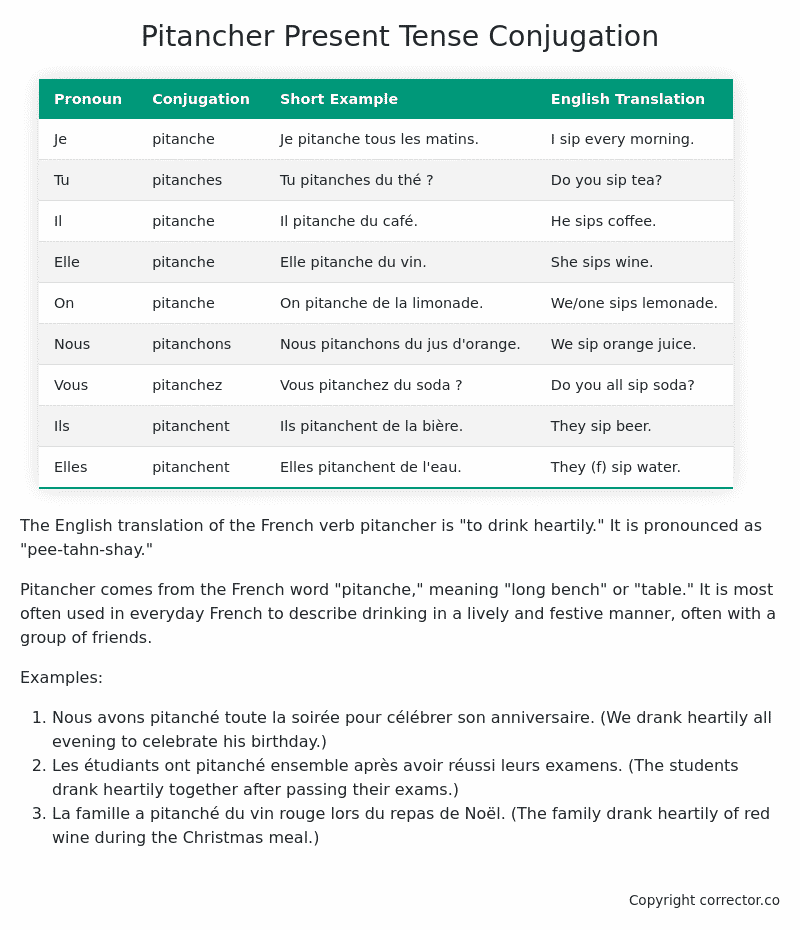Le Present (Present Tense) Conjugation of the French Verb pitancher
Introduction to the verb pitancher
The English translation of the French verb pitancher is “to drink heartily.” It is pronounced as “pee-tahn-shay.”
Pitancher comes from the French word “pitanche,” meaning “long bench” or “table.” It is most often used in everyday French to describe drinking in a lively and festive manner, often with a group of friends.
Examples:
- Nous avons pitanché toute la soirée pour célébrer son anniversaire. (We drank heartily all evening to celebrate his birthday.)
- Les étudiants ont pitanché ensemble après avoir réussi leurs examens. (The students drank heartily together after passing their exams.)
- La famille a pitanché du vin rouge lors du repas de Noël. (The family drank heartily of red wine during the Christmas meal.)
Pitancher – About the French Present Tense
To take a deep dive into all the French tenses then see our article on Mastering French Tense Conjugation.
Common Everyday Usage Patterns For Le Present
Interactions with Other Tenses
Table of the Present Tense Conjugation of pitancher
| Pronoun | Conjugation | Short Example | English Translation |
|---|---|---|---|
| Je | pitanche | Je pitanche tous les matins. | I sip every morning. |
| Tu | pitanches | Tu pitanches du thé ? | Do you sip tea? |
| Il | pitanche | Il pitanche du café. | He sips coffee. |
| Elle | pitanche | Elle pitanche du vin. | She sips wine. |
| On | pitanche | On pitanche de la limonade. | We/one sips lemonade. |
| Nous | pitanchons | Nous pitanchons du jus d’orange. | We sip orange juice. |
| Vous | pitanchez | Vous pitanchez du soda ? | Do you all sip soda? |
| Ils | pitanchent | Ils pitanchent de la bière. | They sip beer. |
| Elles | pitanchent | Elles pitanchent de l’eau. | They (f) sip water. |
Other Conjugations for Pitancher.
Le Present (Present Tense) Conjugation of the French Verb pitancher (this article)
Imparfait (Imperfect) Tense Conjugation of the French Verb pitancher
Passé Simple (Simple Past) Tense Conjugation of the French Verb pitancher
Passé Composé (Present Perfect) Tense Conjugation of the French Verb pitancher
Futur Simple (Simple Future) Tense Conjugation of the French Verb pitancher
Futur Proche (Near Future) Tense Conjugation of the French Verb pitancher
Plus-que-parfait (Pluperfect) Tense Conjugation of the French Verb pitancher
Passé Antérieur (Past Anterior) Tense Conjugation of the French Verb pitancher
Futur Antérieur (Future Anterior) Tense Conjugation of the French Verb pitancher
Subjonctif Présent (Subjunctive Present) Tense Conjugation of the French Verb pitancher
Subjonctif Passé (Subjunctive Past) Tense Conjugation of the French Verb pitancher
Subjonctif Imparfait (Subjunctive Imperfect) Tense Conjugation of the French Verb pitancher
Subjonctif Plus-que-parfait (Subjunctive Pluperfect) Tense Conjugation of the French Verb pitancher
Conditionnel Présent (Conditional Present) Tense Conjugation of the French Verb pitancher
Conditionnel Passé (Conditional Past) Tense Conjugation of the French Verb pitancher
L’impératif Présent (Imperative Present) Tense Conjugation of the French Verb pitancher
L’infinitif Présent (Infinitive Present) Tense Conjugation of the French Verb pitancher
Struggling with French verbs or the language in general? Why not use our free French Grammar Checker – no registration required!
Get a FREE Download Study Sheet of this Conjugation 🔥
Simply right click the image below, click “save image” and get your free reference for the pitancher Present Tense tense conjugation!

I hope you enjoyed this article on the verb pitancher. Still in a learning mood? Check out another TOTALLY random French verb present conjugation!


